How the Legacy of President Trump’s Friendship With Prime Minister Abe Beckons Again in the Pacific
As we face growing global uncertainty, their partnership could serve as a model for enhanced economic strength, energy cooperation, and regional security.

President-elect Trump and Mrs. Trump recently hosted a dinner at Mar-A-Lago for the widow of Shinzo Abe, the former Japanese prime minister, Akie Abe. Before Abe’s assassination in July 2022, the 45th president and Abe forged one of the most fruitful partnerships in the history of America-Japan relations, not to mention a close personal friendship.
During their time together, President Trump and Prime Minister Abe elevated relations between their two countries into the most important bilateral partnership for both, grounded in the mutual conviction that economic strength underpins national security. However, thanks to President Biden’s petulant last-minute torpedoing of Nippon Steel’s proposed merger with United States Steel, that foundation is now at risk.
Trump’s commitment to restore America’s manufacturing capacity combined with Nippon and U.S. Steel’s aggressive plans to pump billions into revitalizing our domestic steel industry presents an almost gift-wrapped opportunity for the president to deploy his negotiating prowess to pull off a quick trifecta.
It would comprise prioritizing the jobs and wages of American workers, delivering an immediate competitive boost to our beleaguered steel industry, and providing a Day One demonstration of how his tariffs are designed to work to strengthen American manufacturing.
American steelworkers overwhelmingly backed Trump and remain central to his coalition. As many as 95 percent of rank-and-file union members polled, moreover, favor the merger, recognizing the potential for high-skilled, good-paying jobs that would come with the huge capital and technological infusion that this merger promises.
This merger could be the harbinger for so many other opportunities for American jobs and investment. Trump’s bold energy agenda could include a massive expansion of liquefied natural gas exports to Japan, which, in turn could serve as a hub in the global liquefied natural gas network to further expand exports of American energy into Southeast Asia, where demand is rapidly rising at 4 percent a year.
Trump is a strong advocate for reinvigorating the Alaska gas pipeline project, which Senators Sullivan and Hagerty are confident could attract serious Japanese investment. This project would deliver economic gains for America while strengthening ties between the two. Anything that improves the economic partnership between two of the world’s largest economies can only help improve the national security of both countries.
Trump, in his first term, advanced American national security interests by reviving the dormant “Quad” partnership — comprising America, Japan, Australia, and India. The Quad plays a vital role in countering aggression by the People’s Republic of China in the Indo-Pacific by safeguarding the world’s most vital maritime trading routes.
The partnership would have to expand intelligence sharing and maritime surveillance to protect undersea cables and expose hostile activities. Japan is already assisting the Philippines with coastal radar systems, but deeper collaboration is needed.
Understanding Trump’s America First approach, which would have allies take on more responsibility for their defense, Abe pushed for a stronger Japanese military capable of operating alongside allies. He secured legislative changes allowing Japanese forces to participate in collective self-defense missions. As Japan increases defense spending to 2 percent of GDP, opportunities for buying American weaponry and supporting American operations will grow.
As we face growing global uncertainty in 2025, the Trump-Abe partnership should serve as a model for enhanced economic strength, energy cooperation, and regional security.
This piece was co-authored by William Chou, who is the deputy director at the Hudson Institute’s Japan Chair.
